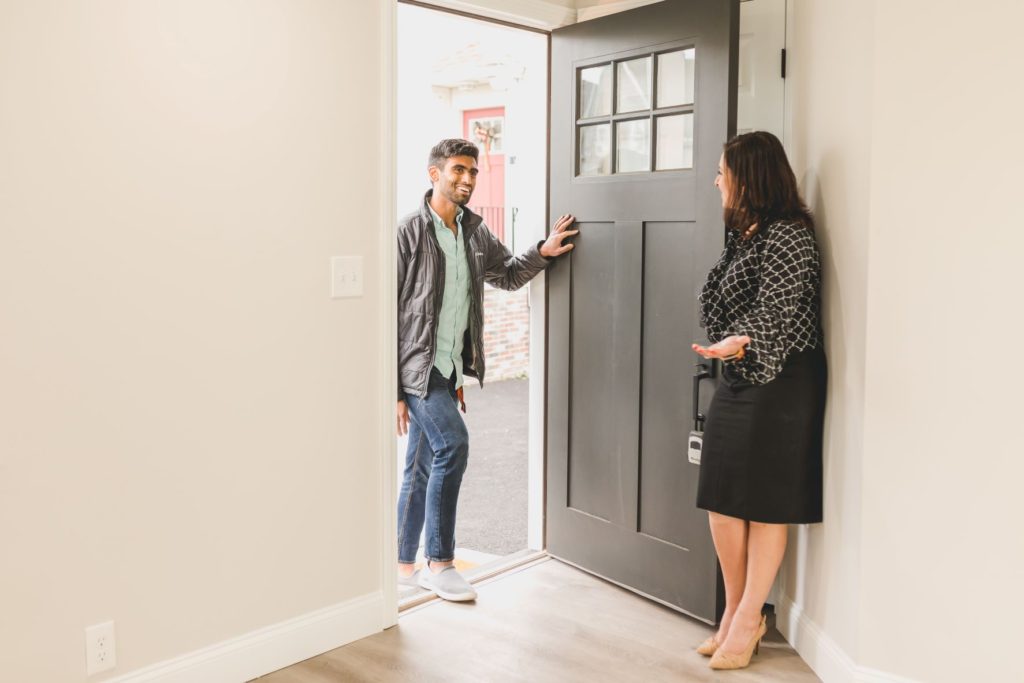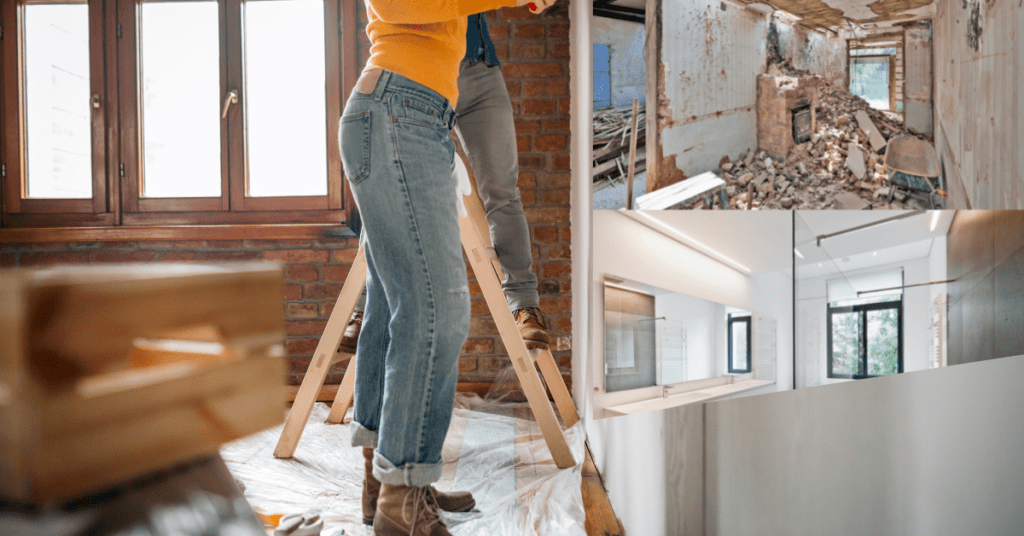Whether you are looking to purchase a fixer-upper to live in or to flip for profit, investment or an additional revenue stream, here are six of the most valuable tips to help you hunt for that ideal diamond in the rough.
Fixer-uppers are essentially homes that are in need of extensive repairs, which can be either structural or cosmetic. They are certainly not your ready-to-move-in kind of home; and it is for that reason they are sold for lower prices.
If you are the type who will make a fuss about inconsequential flaws such as the countertops, backsplash or floor tiles when you view a property, then this is a huge sign that fixer-uppers are not your thing and a turnkey might be more suitable for you. However, if you have a bit of vision and can look at a fixer-upper and spot the potential for improvements, you will be able to tap into deals and opportunities that others are missing.
Here are 6 of my best tips on how to locate the right fixer-upper for you.
Contents
1. Search Real Estate/MLS Websites

The easiest and most convenient starting point is to search property websites where you can preview a number of properties by scanning through photos or virtual tours. Real estate sites such as Rightmove, RE/MAX, Zillow, Realtor.com, Realtor.ca and Coldwell Banker all source their postings from the multiple listing service/system (MLS), which essentially is an online database used by real estate agencies to list properties that are available on the market for sale. These sites might even list properties from Non-MLS sources such as foreclosures or those scheduled for auction.
Since these sites will have a vast number of houses listed, the best way to narrow down your search for a fixer-upper is to:
- identify homes that have an aged or dated appearance and are in obvious need of repairs;
- search for homes that have been sitting on the market for several months without an offer or buyer;
- pay attention to the properties where the sellers reduce the sale prices; and
- find homes that appear to be under-priced relative to their location.
These can sometimes serve as indicators that the property is in poor shape and will require significant repairs.

Increasingly, top property websites such as Rightmove and Zoopla are building more helpful tools in their websites to enhance the search experience for their customers. If you are searching for a fixer-upper on any of these sites, there are smart tools available to help you find locations that are better aligned with your budget among other things.
They also have instant alerts and will shoot you an email the minute they have identified the property that best meets your needs based on information you plugged into their site.
One important thing to bear in mind is that property websites might not necessarily be the best place to find great fixer-upper deals, as most of these properties tend to be long gone before they hit the MLS. Nonetheless, they are a good place to start your journey, as you are able to comparatively evaluate the prices on properties to get the best bang for your buck.
2. Talk with a Licensed Realtor or Agent

If you are new to buying fixer-uppers, consulting with a realtor or agent can help you find some of the best deals. You will want to find a realtor or agent who has solid expertise with fixer-uppers. As they close numerous deals on a daily basis, they are well-equipped to provide insider knowledge on properties that have not yet hit the market, guidance on how to negotiate your best deal, insights on the best neighbourhoods and help you to see the potential in a property.
If you intend on flipping your fixer-upper, a well-seasoned realtor or agent will be able to locate good flip candidates for you and provide tips on how to price and market your fixer-upper for sale, among other things.
Your realtor or agent can also utilize their professional skills and tactics to do some deep digging into your potential fixer-upper and get answers to some of your probing questions, such as:
- How long has the property been on the market?
- How many offers have been submitted thus far?
- Has any crime ever taken place in the house or neighbourhood?
- Why is the owner really selling?
- Is the home prone to flooding or other natural disasters?
- How old is the roof or when was it last repaired?
Ask as many questions as you need to and seek 100% disclosure from the seller. When owners fail to disclose important information about the property, this can seriously affect the profitability, marketability and resale value of your fixer-upper.
3. Look for “For Sale By Owner” or “Short Sale” Properties

Some property owners prefer to sell their homes on their own without involving a realtor or agent. They typically do this in order to save on the cost of the realtor’s sales commission. These sales are usually referred to as “For Sale By Owner” (FSBO). Other property owners might be experiencing financial hardship and are thus inclined to sell their homes for less than the amount due on their mortgages. This is referred to as a short sale.
If you are looking for a fixer-upper and have the confidence and skills to shop entirely on your own without the help of an expert, then you might want to explore the FSBO or short sale route.
- Search FSBO websites such as Craigslist, and Kijiji.ca. These sites contain a wide range of property types, maps containing the property location, unlimited photos and videos that will give you a pretty good visual on the property;
- Browse websites that list short sales such as Zillow.com;
- Find bulletin/message boards in neighbourhoods where you are interested in purchasing your fixer-upper to see if any FSBOs or short sales are posted. This might sound like an old-school method to you but give it a try; it can be quite effective. Bulletin boards can usually be found at local churches, university campuses, libraries, coffee shops, laundromats, or grocery stores;
- Walk or drive around neighbourhoods and see if you can spot yards with “For Sale By Owner” signs. If you do, be sure to take a picture of the sign or scribble down the relevant details such as the address, contact number and listing price; and
- Contact a few local mortgage brokers to find out if they are aware of any FSBO or short sale listings. Brokers will not hesitate to provide this information, especially if you plan on using their services to purchase your fixer-upper.
4. Swing by an Open House

Going to open houses will not necessarily find you the hottest fixer-upper deal, but you certainly will:
- gain more knowledge about prices and what you can and cannot afford;
- get to know the neighbourhood;
- get an up-close view of the property. You will almost certainly gain a different perspective viewing the property with your naked eyes versus scrolling through images and virtual tours from MLS sites; and
- learn about the latest features and amenities that excite buyers so that you can incorporate those trendy elements in your renovated home, especially if you plan on flipping.

If you are running errands on the weekend and spot an open house, seize the moment and stroll right in!
5. Tap into Foreclosure Listings & Auctions

A foreclosed property is one that is owned by the bank or lending institution. Foreclosures typically occur when a borrower defaults on making their mortgage payments; thus, causing the lender to repossess and then sell the property to recover its losses. Foreclosures make great fixer-upper deals because:
- the lender is usually eager to get them off their hands;
- the lender will often sell them at a reduced price, as the objective is not to make a profit but rather to cover the outstanding loan balances, related taxes, administrative costs and legal costs associated with the sale;
- the properties are usually in need of repairs, which automatically lowers their resale value; and
- they typically come with clean unencumbered titles since they have been reclaimed by the lender.

It is for these reasons that foreclosures can be a real goldmine when looking to find an ideal fixer-upper.
Here are some practical tips on how you can find foreclosures to convert into your fixer-upper:
- Attend foreclosure auctions to get a feel for what is available, see how the process of buying foreclosures actually works and chat with people who have profited from purchasing and selling foreclosures.
- Speak to a mortgage broker. They are often incentivized to share foreclosure information, especially if you commit to using their services to purchase your fixer-upper.
- Browse the bank or lender website for properties listed as, “real estate owned” (REO), “bank-owned”, or “power of sale”. These terms refer to properties that have been repossessed by the bank or mortgage lender. Most well-established banks such as Bank of America and Wells Fargo will post their own foreclosure listings.
- Contact the bank or mortgage lender directly and have them transfer you to the section that handles foreclosures. Not every lender will list their foreclosures on their sites.
- Search foreclosure websites such as foreclosure.com.
- Flip through the property section of your local newspaper to find recently listed foreclosures or auctions.
- Scroll through public records at no cost to you, and try to find notices of sale or default. The best source of these records is the local courthouse or clerk of courts office. Often properties found through this source are genuine hidden gems and have not yet hit the open market.
- Seek after government-owned foreclosure properties. If a homeowner defaults on their mortgage to a government agency, the agency like a bank or lender, will repossess the property and sell it to pay off any outstanding debts owed by the homeowner. Similar to foreclosures sold by a bank or lender, these properties make an ideal fixer-upper, as they are usually sold at discounted rates.
- Get in touch with real estate investors who might have some incredible intel on properties that are about to move into foreclosure or have just been foreclosed upon.
- Search tax records if you have a bit of time on your hands. This is a worthwhile task if you are pursuing a fixer-upper that you are deeply in love with and will pull out all the stops to get. Once you have information on the homeowner’s name and property location, you can search their tax records to see if they are experiencing any financial hardship. This can be a tell-tale sign that the property is at the risk for foreclosure.
6. Drive or Walk the Neighbourhood

Driving or walking at different times of the day, is a good old-fashioned strategy for hunting down fixer-uppers in your target neighbourhood/s. This is a great way to:
- identify properties that are unkempt or in disrepair such as those with overgrown grass or little or no landscape, scruffy looking driveways, an abandoned car parked in the yard, junk items thrown all over, boarded-up windows or a dilapidated porch.
- talk with the neighbours to get some useful intel on whether the owners are contemplating sale.
A tour of the neighbourhood will also encourage you to look into the history of the neighbourhood such as past flooding etc.
If you have spotted a potential fixer-upper but you’re not sure if it is or will be made available on the market for sale, what better way to find out than to reach out directly to the homeowner and let them know you have a genuine interest in purchasing the property. You have absolutely nothing to lose by doing this and you just never know where this may take you.
Did you find this article useful? Do you want other information on fixer-uppers? If yes, drop me a comment below.
Author
Monique Abbott
Hi, I ’m Monique, founder and editor-in-chief of Yes2Yolo, travel addict and lover of home makeover projects.
I’ve explored over 60 countries with my husband Nick. Together we’ve partnered on some truly exciting projects such as creating and running a successful Airbnb business, chairing condo boards, purchasing fixer-uppers and renovating them from scratch on our own while balancing all of this with full-time jobs and family.
While my personal passions are travel and home décor, I am, by profession, a lawyer with over 17 years experience.




Awesome content! Great tips, thank you so much for sharing.
Loved this article Monique. It’s a well thought out and detailed guide. Wishing your new Blog tons of success:)
Thank you Cecille. You should definitely add it to your bucket list. You’ll LOVE it!
Very informative, the links you provide are essential starting points
Thank you Edward!